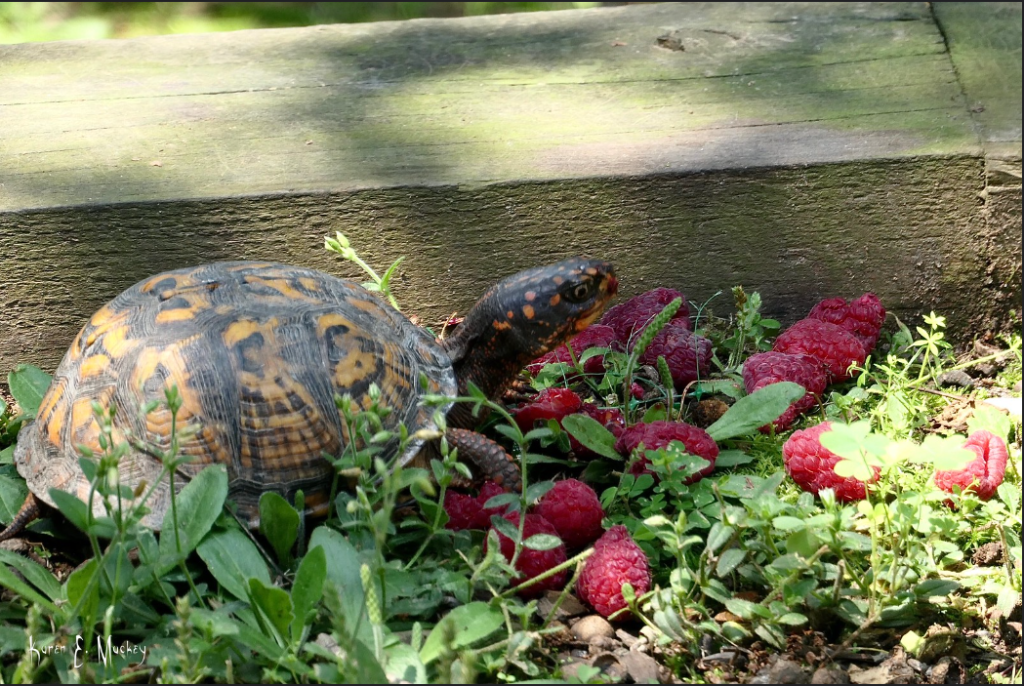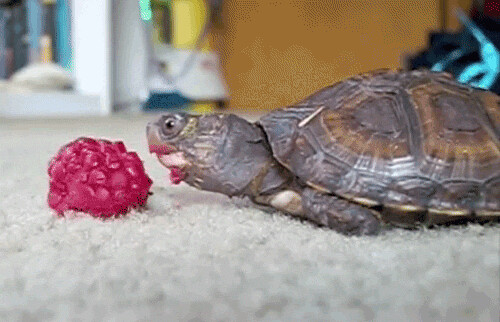Turtles can eat raspberries in moderate amounts, but it should not be a regular part of their diet. Turtles are omnivorous animals that eat a combination of both plant and animal-based foods in the wild.
They have a broad natural diet that consists of leafy greens, fruits, vegetables, insects, and small aquatic animals. When it comes to feeding your pet turtle, it is important to mimic their natural diet as closely as possible. While it is okay to offer them a small amount of raspberries as a treat, it should not be a frequent part of their meal plan.
Overfeeding them with fruits or sugary foods could lead to health problems such as obesity and diabetes. In this article, we will explore more about what turtles can eat, their nutritional requirements, and how to offer them a balanced diet.

Credit: Karen E. Mackey
Understanding Turtle’S Diet
Examining Turtle’S Natural Habitat And Food Sources:
Turtles are one of the oldest creatures that roam the earth today. They have been around for over 200 million years and have evolved to adapt to different environments. Understanding their natural habitat and food sources is crucial in keeping them healthy and happy!
- Turtles can be found in various habitats, including freshwater ponds, lakes, marshes, and streams.
- Aquatic turtles feed mainly on plants and animals found in their habitat, such as insects, snails, fish, and aquatic vegetation.
- Terrestrial turtles, on the other hand, eat a variety of fruits, vegetables, small animals, and insects found in their natural environment.
Analyzing Turtle’S Feeding Habits And Requirements:
Feeding habits and requirements vary depending on the species of turtle. However, understanding their dietary needs is essential to keep them healthy. Here are some crucial things to consider:
- Juvenile turtles require a more protein-rich diet, while adult turtles require more plant-based food.
- Daily feeding patterns depends on the species of turtle. For example, box turtles eat less often, compared to aquatic turtles who require daily feeding.
- It’s vital to provide your turtle with a balanced diet that meets their nutritional needs. Always consult with a veterinarian to ensure they are getting the right food.
Exploring Turtle’S Dietary Restrictions And Challenges:
Turtles have specific dietary restrictions and face challenges when it comes to their food sources. Here are some important things to keep in mind:
- Certain types of turtles like the herbivore red-eared slider can’t safely digest animal-based protein and require a more herb-based diet.
- Feeding turtles the wrong types of food can cause serious health issues such as bladder stones, shell rot, and other metabolic and digestive problems.
- It’s essential to avoid feeding turtles human food such as chocolate, candies, and dairy products, as they are not suitable for their digestive systems.
Understanding the diet and needs of turtles is essential to their overall health. By providing them with a balanced, species-specific diet, correct feeding habits, and avoiding harmful foods, we can ensure they have a happy and healthy life.
Fruit-Based Diets For Turtles
Introducing The Concept Of Fruit-Based Diets For Turtles
Turtles, like most animals, require a balanced and varied diet to stay healthy and active. While a wild turtle’s diet predominantly consists of vegetation, fruits are also an excellent source of various nutrients for them. As more turtle owners have been experimenting with fruit-based diets, let’s take a closer look at the benefits and drawbacks.
Exploring The Benefits And Drawbacks Of Fruit-Based Diets
Benefits
- Provides a variety of nutrients such as vitamins, minerals, and antioxidants
- Adds behavioral enrichment in their diet, encouraging natural foraging behaviours.
- May help turtles with digestive issues and increase their appetite
- Reduction of illnesses because of high nutrient contents of fruit
Drawbacks
- High sugar content in fruits, which can lead to obesity, diabetes, and other diseases if not correctly balanced.
- Overconsumption of fruits can lead to diarrhea, nutritional imbalances, and decreased immunity system
- Risk of mites and fruit flies infestation due to sweet fruits
- Potential dental problems because of the natural sugars in fruit formulations.
Investigating The Impact Of Fruit-Based Diets On Turtle’S Health
Turtles’ digestive systems are not designed to break down the complex fibers found in fruits. The imbalance of nutrients, especially calcium to phosphorus ratio, can lead to diseases such as metabolic bone disease. Fruit-based diets can also lead to vitamin deficiencies, obesity, and digestive problems if turtles are not provided an appropriate amount and correct variety of vegetables and animal protein.
However, when offered in moderation, fruits in a well-rounded diet can contribute to turtles’ overall good health and comfortable life. Since the diet varies according to the species and age of turtles, it is necessary to consult a vet before making any significant changes in the diet.
Examining The Suitability Of Raspberries For Turtles

Credit: Pongaparty
Raspberries are generally safe for turtles to eat in small and moderate amounts. They contain vitamins c, k, and e and are low in calories, but high in sugar. Giving turtles raspberries rather than being a staple food makes it balanced with other food sources and decreases the risk of illness from overconsumption.
Note that giving too many can affect the digestive system and cause diarrhea. Turtles can eat raspberries with seeds as turtles are omnivores and their digestive system can break them down, but be sure to rinse them gently to reduce the risk of contaminants.
They are delicious as treats but should not replace the recommended dietary staples.
Nutritional Analysis Of Raspberries
Can Turtles Eat Raspberries? – Nutritional Analysis Of Raspberries
Raspberries, one of nature’s sweet treats, are packed with nutrients. But are they suitable for turtles to consume? Let’s investigate the nutritional content, potential benefits, and risks of feeding raspberries to our shelled friends, as well as the appropriate serving size for your turtle.
Analyzing The Nutritional Content Of Raspberries
Raspberries are low in calories and high in nutrients such as vitamin c, manganese, and dietary fiber. Here is a breakdown of the nutritional content for 1 cup (123g) of raspberries:
- Calories: 64
- Carbohydrates: 14.7g
- Fiber: 8g
- Protein: 1.5g
- Fat: 0.8g
- Vitamin c: 54% of the daily value (dv)
- Manganese: 41% of the dv
- Vitamin k: 12% of the dv
- Magnesium: 7% of the dv
Evaluating The Potential Benefits Of Raspberries For Turtles
Turtles require a diverse diet rich in nutrients to remain healthy. Raspberries could be a healthy snack for your turtle that provides essential vitamins and minerals. Here are potential benefits of feeding raspberries to turtles:
- Raspberries are a good source of vitamin c, which turtles cannot synthesize on their own. Vitamin c strengthens the immune system and aids in wound healing for turtles.
- The high fiber content in raspberries promotes healthy digestion for turtles.
- Raspberries are a low glycemic index fruit, making them a suitable snack for turtles at risk of developing diabetes.
Investigating The Potential Risks Of Feeding Raspberries To Turtles
Although raspberries are an excellent source of nutrition, they may not be suitable for turtles with specific health issues. Here are potential risks of feeding raspberries to turtles:
- Turtles with a history of oxalate-based kidney stones may be sensitive to the oxalates found in raspberries.
- Raspberries, like all fruits, are high in natural sugars. Overconsumption can lead to obesity in turtles.
Discussing The Recommended Serving Size For Turtles
As tempting as it may be to provide your turtle with raspberries as a treat, it is crucial to determine the appropriate serving size. Overconsumption of raspberries can lead to obesity, diarrhea, and other health issues. Below are the recommended serving sizes of raspberries for turtles:
- For hatchling turtles: A maximum of one raspberry per week or 1-2 berries every two weeks.
- For young and adult turtles: Half a raspberry once a week or every two weeks.
Raspberries are a tasty, low-calorie snack for turtles that can provide essential vitamins and minerals. However, moderation is essential when feeding them to your turtle to prevent health complications. Keep in mind that a balanced diet that meets your turtle’s specific nutritional needs is crucial for their overall health.
How To Feed Turtles With Raspberries
Can turtles eat raspberries? The answer is yes! Turtles can consume a variety of fruits, and raspberries are one of them. However, before feeding your turtles with raspberries, several factors need to be considered. In this section of the blog post, we will explore the best practices for feeding raspberries to turtles, discuss the factors to consider before feeding turtles with raspberries, and provide a step-by-step guide on how to feed turtles with raspberries.
Exploring The Best Practices For Feeding Raspberries To Turtles
When feeding your turtles with raspberries, you should adhere to certain best practices to avoid any potential harm to their health. Here are some of the bset practices which you should consider before feeding your turtles with raspberries:
- Always choose ripe raspberries, not the unripe ones.
- Clean the raspberries properly before feeding them to your turtles as they may contain pesticides or other chemicals harmful to turtles.
- Avoid overfeeding your turtles with raspberries as they contain a high amount of sugar, which can lead to obesity.
Discussing The Factors To Consider Before Feeding Turtles With Raspberries
Before feeding your turtles with raspberries, several factors must be considered to ensure that they maintain optimal health. Here are some factors you should keep in mind before feeding turtles with raspberries.
- Age: Different turtle species and age groups have varied dietary requirements, and it’s essential to consider their age before feeding them with raspberries.
- Health condition: Check your turtle’s health condition before feeding them with raspberries. If your turtle has certain health issues, it’s advisable to avoid feeding them raspberries as some turtles may be allergic to them.
- Quantity: Overfeeding your turtles with raspberries can lead to digestive issues and obesity, so be mindful of the quantity.
Providing A Step-By-Step Guide On How To Feed Turtles With Raspberries
If your turtle’s dietary requirements allow them to consume raspberries, here is a simple step-by-step guide on how to feed them with raspberries:
- Clean the raspberries thoroughly and ensure they are ripe.
- Cut the raspberries into small, bite-sized pieces.
- Offer the raspberries to your turtles by placing them in a shallow dish or directly on the ground.
- Monitor your turtle’s feeding, and avoid overfeeding, especially if your turtle is still getting used to eating raspberries.
Raspberries are a healthy and nutritious snack for turtles that can be included in their diet, provided the appropriate feeding guidelines are followed. Remember to consider the best practices, factors that need to be taken into consideration, and the proper steps to feed your turtles.
Frequently Asked Questions For Can Turtles Eat Raspberries
Can Turtles Eat Raspberries?
Yes, turtles can eat raspberries, as they are safe and healthy for them. Raspberries are a great source of vitamins and minerals that help maintain turtles’ health.
What Other Fruits Can Turtles Eat?
Turtles can eat a variety of fruits, including bananas, strawberries, blueberries, and watermelons. However, make sure to feed them in moderation and remove any seeds or pits.
How Often Can Turtles Eat Raspberries?
Turtles should only eat raspberries and other fruits as treats. It is recommended to feed them once in a while, not more than once or twice a week.
Do Raspberries Provide Any Health Benefits For Turtles?
Raspberries contain antioxidants, vitamins c and k, and fiber, which promote good health for turtles. They also help strengthen their immune system.
Can Raspberries Harm Turtles In Any Way?
While raspberries are generally safe for turtles, too much of them can cause diarrhea, digestive problems, and obesity. Make sure to feed them in moderation.
How To Feed Raspberries To Turtles?
Cut raspberries into bite-sized pieces and offer them to your turtle. Avoid serving frozen raspberries and make sure to wash them properly before feeding your pet.
Conclusion
After careful consideration, it can be concluded that turtles can eat raspberries as they are not toxic to them. However, raspberries should only be given to turtles in moderation as they are not a part of their natural diet and may cause health issues if consumed in large amounts.
Overall, while raspberries may be a tasty and safe occasional treat for turtles, their diet should be carefully monitored to ensure their optimal health and wellbeing.
Recent Posts
Hermann tortoises can eat watermelon, but only in moderation. This fruit should not be a staple in their diet due to its high sugar content. Hermann tortoises are fascinating creatures that...
Turtles headbutt black things due to their instinctual response to threats or territorial disputes. When turtles encounter black objects, they may perceive them as intruders or competitors, leading...

